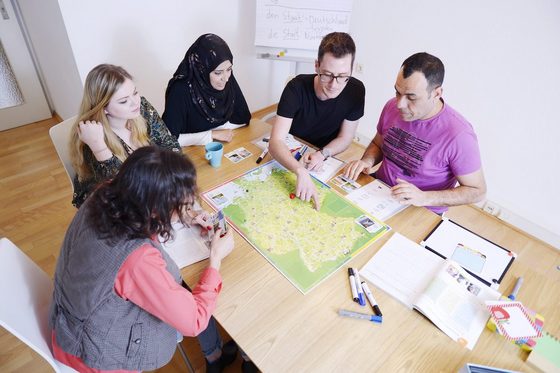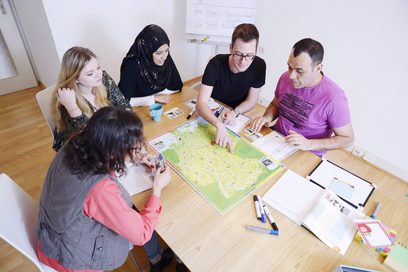Diese Seite ist erreichbar unter:
https://abi.de/unterstuetzung/start-in-deutschland/a-language-course-in-preparation-for-a-degree
Melika Sabzevari left Iran together with her mother for Lower Saxony. The 22-year-old wants to study psychology there to be able to help her compatriots in the future.


Melika sees herself as an artist. She took photos and organised her first exhibitions as an adolescent. Since being forced to leave her home country of Iran, however, she has a different career aspiration – one with which she is able to support other Iranians.
The 22-year-old grew up in the port city of Mahshahr, where she went to school for twelve years and graduated with very good grades. In 2019, however, the situation in her homeland became so uncertain that she left for Europe together with her mother. The two women went to Sweden first, before moving to Germany in the spring of 2021, where they now live together in Braunschweig.
A few months after her arrival in the city, Melika began to look at her opportunities for studying at a university. “I graduated from high school and wanted to go to university in Iran,” she explains. That is why she is now interested in studying for a degree in Germany.
Before leaving Iran, she had thought about studying art. That has now changed: “I want to study for a degree in psychology,” explains Melika. “As a psychologist, I would like to help my compatriots in the future, as I believe that the Republic of Iran has done psychological and physical harm to many people over the past 40 years, and many of us need support with our mental health.” Her goal is to stay in Germany and to help Iranian people living here.
Melika still has a long way to go, though. First of all, she has to learn German. When looking for a suitable German course she came across the “Bridges4Refugees” project at the University of Braunschweig Institute of Technology. This is a bridging course which is offered by the university in cooperation with the German Academic Exchange Service (DAAD).
The course is aimed at refugees who want to study for a degree but who do not yet have the German language skills to be able to do so. Depending on their level of knowledge, they learn the language within three to twelve months and then complete their course with the “German as a foreign language test” (TestDaF). If they successfully pass the test, they can then study for a degree at the TU Braunschweig – or at another university in Germany.
On her arrival in Lower Saxony, Melika couldn’t speak a word of German. She applied for the intensive language course with a certified copy of her school certificate and a covering letter in English. This was followed by a 15-minute interview in English in which the native of Iran spoke about her study-related goals. A week later she was accepted, and since August 2022 she has been learning German for five hours every day.
“It is, of course, very intense, but both the atmosphere on the course and the classes are great,” explains Melika. “I am also very motivated because I want to build a good life for myself in Germany – and having good language skills is very important for that.” She has already achieved the B1 language level, but wants to learn more. “The better my German is, the easier it will be for me to study for a degree.”
Melika is planning to pass the final test for her language course in September 2023 before attending a preparative course in maths. “I’ve spoken to several students at the university and have heard that such a course could be helpful in refreshing my knowledge of maths.”
At the same time, the 22-year-old wants to apply for a place on the psychology programme at the University of Braunschweig Institute of Technology, and hopes to be able to start her degree in the summer semester of 2024.
Stand: 08.05.2023
Vielen Dank für dein Feedback zu dieser Seite! Deine Kritik oder dein Lob zu abi.de kannst du uns gerne auch ergänzend über „Kontakt“ mitteilen. Deine abi» Redaktion
Diese Seite ist erreichbar unter:
https://abi.de/unterstuetzung/start-in-deutschland/a-language-course-in-preparation-for-a-degree